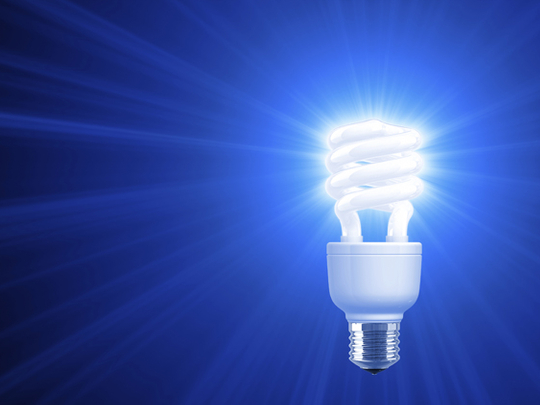
Dubai: Light bulbs that are not energy efficient will be banned across the country from mid-2013 as the Emirates Authority for Standardisation and Metrology (Esma) expands its range of efficiency standards to cover more electrical equipment and appliances.
The move will also affect washing machines and refrigerators.
The new standards will require all light bulbs sold and used in the country to be eco-friendly as per the rating system, which will be announced early next year.
Only the likes of compact fluorescent light bulbs and LED bulbs will fall into the approved category, under the ratings system currently being devised.
"We are covering different electrical equipment and appliances gradually on a priority basis and early next year we will announce the new set of appliances covered under the ratings system," said Mohammad Saleh Badri, acting director-general of Esma, speaking exclusively to Gulf News.
The authority is currently in discussions with different stake holders — including distributors, manufacturers as well as retailers of light bulbs — to study the impact of the ban and making sure all ends are covered before any such move is made.
Government subsidy
"We want to make sure nobody is adversely affected, most importantly the consumers. We don't want to put an additional burden on the consumers because of the ban on normal bulbs, so we are studying the impact of the ban and, if possible, we will [proceed with the ban] if the government can subsidise eco-friendly bulbs to bring the prices down," Badri elaborated.
The fluorescent energy-efficient bulbs are four to five times costlier than the normal incandescent bulbs. However, fluorescent energy-efficient bulbs consume up to five times less power and in the long run save a lot of money.
Fluorescent bulbs also last up to ten times longer, which in effect means they are much more cost-effective in the long run.
Once the difference is ascertained and the regulations are drafted, which are likely to be ready with Cabinet ratification by the end of this year, incandescent bulbs will be effectively banned.
"The regulations would effectively ban incandescent and halogen bulbs as they consume a lot of energy and would not make the cut. We urge all consumers to stop buying these bulbs and replace them with energy efficient white bulbs, which will save a lot of power as well as money," Badri said as he highlighted the benefits behind the move.
Interestingly, the first phase of implementation will require all government departments to replace their lighting systems with the more-efficient alternatives.
"We are coordinating with different government departments to implement [the plan] at the government level first. We are in talks with the Roads and Transport Authority Dubai (RTA), the Department of Transport Abu Dhabi and several municipalities to see whether they can replace street lamps with energy-efficient bulbs. If this happens it will be a great achievement," Badri said.
Though it might take a while, Esma is working on replacing all industrial lighting, as well as flood lights used at sports stadiums and entertainment arenas.
"Our primary focus is on domestic and personal users, but we will gradually cover all types of lights, including decorative lights, flood lights, etc. There are energy-efficient alternatives for [the] type of lightings and we will slowly push for their replacement at every level," Badri said.
All new white goods will need to use less power
The rating system for refrigerators and washing machines is similar to the one already in place for air-conditioners (AC) since January this year.
Like ACs, all washing machines and refrigerators would be clearly rated and labelled from ‘One Star' to ‘Five Star' based on their energy efficiency.
"We are working to decide on the cut off marks for the Minimum Energy Performance, which is 5.9 in case of ACs, and any product falling below the cut off is not allowed to enter the country," Mohammad Saleh Badri, acting director-general of ESMA, said as he explained the rating mechanism.
The energy-efficiency ratings are part of an overall set of standards, which covers all products that have an impact on consumers. The standards focus on the safety, quality and environmental aspects of a product.
"The safety and quality standards for all kitchen appliances have already been enforced, while the energy-efficiency standards are being implemented gradually," Badri said.
Certificate of conformity
According to new standards, all electrical appliances imported to the UAE or produced in the country need to obtain a certificate of conformity from Esma before they hit the market.
"We are hoping that only Five Star appliances will come to the UAE," Badri said.
The regulations will be ready by January 2013 and a grace period of six to eight months would be provided before implementation.












